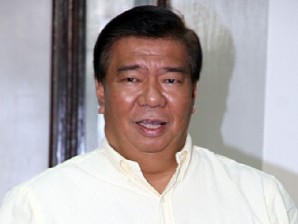Liberal Party cool to talks with Supreme Court
Senators belonging to the ruling Liberal Party (LP) are not keen on the proposal for mediation between President Benigno Aquino III and the Supreme Court led by Chief Justice Renato Corona.
Senator Franklin Drilon, the vice chairman of the party, on Thursday told reporters that it was “extremely difficult to look for a middle ground” in the mediation proposed by some members of the Catholic Bishops’ Conference of the Philippines.
Drilon said that while the President had indicated an openness to a dialogue, “the difficulty in the situation is that the Supreme Court insists that its decisions are in accordance with the law.”
“So if I am the mediator, I will not know where I will start,” he said.
Drilon pointed out that the conflict between the President and the high court did not arise from “a difference in policy, where you can mediate,” but from “the perception that the Supreme Court is not up to its task of being an impartial arbiter of disputes.”
Article continues after this advertisement“I cannot see how you can mediate this dispute between the Supreme Court and Malacañang,” he said.
Article continues after this advertisementInstead of endorsing the mediation proposed by some bishops, Senator Francis Pangilinan reiterated his call for Corona’s inhibition from cases involving former President and now Pampanga Representative Gloria Macapagal-Arroyo, who named the latter to the post of Chief Justice in a “midnight appointment.”
“The key issue in the clash between the executive and judicial branches is the string of controversial rulings that have placed grave doubt on the fairness and impartiality of the court,” Pangilinan, the Liberal Party’s vice president for external affairs, said in a statement.
“Many of these rulings have prevented the executive [branch] from pursuing its commitment to addressing pervasive corruption and exacting accountability and justice,” he said, adding:
“These highly questionable rulings cannot be the subject matter of mediation or conciliation or talks. I may be mistaken, but I am afraid that at this point, any talks between the two branches will just be for show, or pakitang tao lamang, and will not help address the problem.”
Trigger was TRO
Supporters of the Supreme Court argue that Corona, despite being the Chief Justice, is good for only one vote in the 15-member chamber.
To this, Drilon said: “That might be the theory, but the decisions do not confirm that theoretical premise.”
Pangilinan said Corona’s inhibition would “help” ease the tension triggered by the President’s series of public attacks against the Chief Justice and the high court.
According to Mr. Aquino’s spokesperson Edwin Lacierda, it was the temporary restraining order (TRO) that the high court issued on the travel ban on Arroyo, and not its ruling on the distribution to farmers of Hacienda Luisita, the sugar estate owned by the Aquino-Cojuangco clan, that served to renew the conflict between the executive branch and the judiciary.
“The trigger point really was the TRO,” Lacierda said yesterday at a news briefing. “The TRO compelled us to think, Why is the government being prevented from presenting their side?”
The TRO, issued on November 15 by the high court on a vote of 8-5, effectively lifted the travel ban on Arroyo. But Justice Secretary Leila de Lima insisted that Arroyo’s inclusion in the immigration watch list remained in effect pending the justice department’s receipt of a copy of the TRO.
Lacierda would not comment on suggestions that the President was laying the groundwork for the impeachment of Corona, saying Mr. Aquino had yet to disclose his plans on the matter.
But Lacierda did say that it would not be the first time for an impeachment complaint to be brought against a Chief Justice. He cited the impeachment proceedings against then Chief Justice Hilario Davide, and a similar case against a chief justice in the United States.
Impeachment an option
Ronald Llamas, the President’s adviser on political affairs, said Corona’s impeachment was “an option” when asked whether Mr. Aquino was laying the groundwork for it in questioning the Chief Justice’s appointment a week after the May 2010 elections.
“Regarding impeachment, it is always an option but it is to be exercised by Congress and not by the executive [branch], consistent with the Constitution,” Llamas told the Philippine Daily Inquirer in a text message sent from Geneva, where he was attending a United Nations conference.
Pressed if Corona’s impeachment was an option that the executive branch had with the help of its allies in Congress, Llamas said: “What I mean is that it’s a course of action available under and sanctioned by the Constitution.”
“We defer to the leadership of Congress at this point—whether they’ll decide to pursue it or not,” he said.
In his recent speeches, Mr. Aquino questioned the haste with which the Supreme Court granted the Arroyo camp’s petition for a TRO on the ban on her travel abroad, and harped on its reversals of its decisions that, he said, led to uncertainty and made effective governance difficult.
Llamas said Mr. Aquino was merely articulating “widely held sentiment.”
He added: “The President has been consistent from the start in his position on the Chief Justice’s midnight appointment.
“Overwhelming public frustration with the court’s decisions, particularly with regard to efforts to hold abusive public officials from the previous administration accountable, only shows that the apprehensions regarding the Chief Justice’s appointment were well-founded.”
